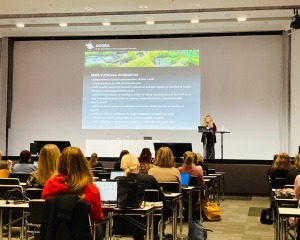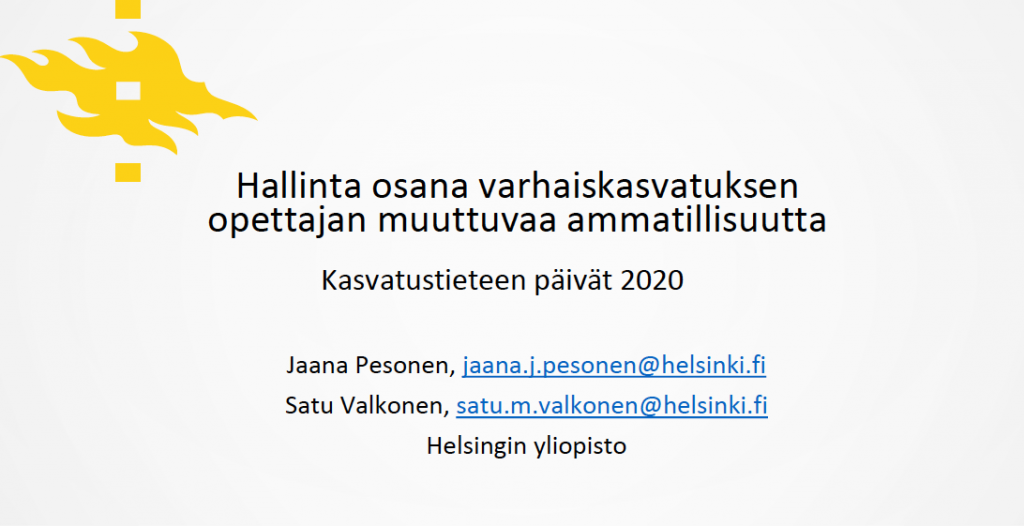Suomessa koulutuksesta puhutaan edelleen, hämmästyttävää kyllä, romantisoidusti. Ylpeilemme koulutuksen mallimaasta, vaikka emme ole enää tai ehkä koskaan olleetkaan koulutuksen mallimaa (mitä se ikinä tarkoittaakaan). Koulutus nähdään ratkaisuna tai reseptinä vaivaan kuin vaivaan; koulutus pelastaa koko yhteiskunnan, talousjärjestelmän ja yksittäiset kansalaiset. Koulutuksen ajatellaan suojelevan yksilöitä huonoilta vaikutteilta, kuten ajautumasta rikolliselle elämänpolulle tai totaaliselta syrjäytymiseltä. Samalla koulutuksen puutetta ehdotetaan syyksi mitä erinäisemmille yksilöllisinä nähdyille ongelmille. Mitä suurempi osa kansalaisista saadaan koulutuksen piiriin, yhä varhaisemmin ja mielellään koko loppuelämäksi, sitä parempi.
Koulutususko estää näkemästä koulutuksen ongelmia
Koulutususko tarkoittaa siis uskoa ja luottamusta siihen, että koulutuksesta seuraa siihen osallistuville ja sitä kautta koko yhteiskunnalle hyviä asioita. Jokainen on varmasti törmännyt sekä yksityiselämässä että julkisessa keskustelussa tähän itsestäänselvyytenä pidettyyn totuuteen, jossa koulutus takaa vakaan toimeentulon, opettaa työelämässä tarvittavia tietoja ja taitoja ja tarjoaa työkaluja itsensä ja maailman ymmärtämiseen. Lähtökohtaisesti koulutususko ei kiellä koulutusjärjestelmän ongelmia, vaan pyrkii ylittämään nämä ongelmat erilaisten ratkaisumallien, tukijärjestelmien ja kehittämishankkeiden kautta.
Ongelmallista on puolestaan naiivi koulutususko, jossa suljetaan silmät koulutusjärjestelmän ongelmilta. Naiivi koulutususko saa perään kuuluttamaan lisää koulutusta ja erilaisia psyko-emotionaalisia tukijärjestelmiä sen sijaan, että tarkastelisimme huolella sitä, mitä yhteiskunnassa ja sen osana toimivassa koulutuksessa tapahtuu, mikä on koulutuksen ja opetuksen yhteiskunnallinen rooli, tavoitteet ja metodit samoin kuin koulutuksen ja eriarvoisuuden suhde. Kriittisemmän tarkastelun sijaan tyydymme luottamaan siihen, että koulutus ja tukijärjestelmät toimivat, tukevat kaikkia ja tuottavat lähtökohtaisesti hyvää.
Meillä on paljon tutkimusta Suomenkin kontekstissa siitä, että vaikka koulutuksessa on monia hyviä asioita, on siellä myös ongelmia. Koulutus ja erilaiset tukijärjestelmät uusintavat eriarvoisuutta, joka liittyy esim. sukupuoleen, etnisyyteen, varallisuuteen, seksuaalisuuteen, vammaisuuteen ja muihin eroihin. Asian voi ilmaista myös seuraavasti: me kaikki olemme jossain mielessä erilaisia, ja meillä kaikilla on erilaisia taustoja, mutta koulutuksen ja opetuksen käytännöissä, oletuksissa, kohtelussa ja vuorovaikutuksessa joistakin eroista ja taustoista tulee yksilöiden olemukseen kiinnittyviä ja yksilön vastuulla olevia ongelmia. Voidaan toki myös todeta, että koulutus ei ole koskaan ollut vapaa yhteiskunnallisen eriarvoisuuden ja etuoikeuksien uusintamisesta. Koulutuksen yhtenä yhteiskunnallisena funktiona, joskaan ei välttämättä julkisena, on koko sen historian ajan ollut etuoikeuksien ja eriarvoisuuksien ylläpitäminen.
Järjestelmän, ei yksilöiden ongelma
Tutkimus on tuonut esille, kuinka varhaiskasvatuksessa, peruskoulussa, koulutussiirtymissä, korkeakoulutuksessa ja aikuiskoulutuksessa tuotetaan eriarvoisuutta tavoilla, jotka voivat aiheuttaa merkittäviä hankaluuksia ja vastoinkäymisiä lapsille ja nuorille. Koulutuksen käytännöt ohjaavat ihmisiä eri tavoin riippuen heihin etukäteen kohdistuvista oletuksista ja odotuksista. Suomessa esim. sukupuolen mukainen segregaatio on poikkeuksellisen vahva ja se alkaa jo varhaiskasvatuksesta. Sama pätee muihinkin eroihin, kuten etnisyyteen. Koulutus ohjaa lapsia ja nuoria paikoille, joihin heidän ikään kuin kuuluisi asettua ja jossa heille tarjoutuu jossain määrin valmiiksi käsikirjoitettu rooli. Tämä näkyy esimerkiksi siinä, kuinka tyttöjen oletetaan kategorisesti olevan ahkeria ja tunnollisia, poikien villejä ja alisuoriutuvia ja maahanmuuttajataustaiset lapset ja nuoret eräänlainen yksi ryhmä ja haavoittuvia. Koulutuksessa ei välttämättä myöskään osata kohdata taloudelliseen ja yhteiskunnalliseen hyväosaisuuteen kiinnittyvää eriarvoisuutta ja etuoikeuksia. Pahimmillaan esimerkiksi köyhyydestä voi muodostua yksilöihin kiinnittyviä leimoja ja tahroja, kuten olemme tuoneet omassa tutkimuksessamme esille.
Tilanteesta ei pidä syyttää yksittäisiä opettajia, jotka koulutetaan kantamaan harteillaan kansakunnan tulevaisuutta, vaan ongelma on koko koulutusjärjestelmän ja sitä koskevan poliittisen ohjauksen historiallisesti muotoutuneessa rakenteessa. Koulutus ei tarjoa riittävästi yhteiskuntalukutaitoa ja tutkimuslähtöistä ymmärrystä ja välineitä nähdä ja puuttua eriarvoisuuteen niin omassa ajattelussa kuin laajemminkaan koulutuksen käytännöissä ulottuen opetuksen käytännöistä opetusmateriaaleihin ja kaikkeen vuorovaikutukseen, viralliseen ja epäviralliseen. Kiinnostavaa on sekin tässä todeta, että koulutukseen on Suomessa koetettu viedä vuosikymmeniä tasa-arvon ja yhdenvertaisuuden tutkimusta, ymmärrystä ja hyväksi todettuja toimintamalleja, mutta koulutus on käytäntöineen kylmänrauhallisesti hylkinyt niitä.
Koulutuksen historiallinen murros jää piiloon
Naiivi koulutususko ei rajaudu vain eriarvoisuuden kysymyksiin. Se estää näkemästä myös laajemmin sitä, mitä yhteiskunnassa ja koulutuksessa on laajemmin tekeillä. Koulutuksen yhteiskunnallinen rooli on muuttumassa, ehkä historiallisesti merkittävämmällä tavalla kuin koskaan. Koulutuspolitiikan tutkimus on jo pitkään tuonut esille sitä, että koulutus markkinoituu, yksityistyy ja kaupallistuu, toisin sanoen markkinat ovat astuneet voimallisesti koulutukseen. Tämä on jo tuonut ja tuo tulevaisuudessa isoja muutoksia koulutuksen tavoitteisiin, sisältöihin ja toteuttamistapoihin samoin kuin siihen, mitä ajattelemme tiedosta ja ylipäätään ihmisyydestä. Tätä tutkimme meneillään olevassa koulutuksen tulevaisuuden suuntaviivoja tarkastelevassa kansainvälisessä FuturEd-tutkimushankkeessa. Jos hieman kärjistäen asian ilmaisisi, niin koulutuksesta on tekeillä jättimäinen terveyden, hyvinvoinnin ja liiketoiminnan keskus, joka täsmävalmentaa lapsista, nuorista ja aikuisista resilienttejä ja taloustalkoohenkisiä työmarkkinakansalaisia.
Muutoksia edellisen osalta tapahtuu Suomessa varhaiskasvatuksesta korkeakoulutukseen ja aikuiskoulutukseen. Markkinoituminen, eli koulutuksen merkityksen ja tavoitteiden perusteleminen liike-elämän ja työmarkkinoiden näkökulmasta relevantiksi, on jo nyt tuonut koulutukseen uusia ideologioita, agendoja, intressejä ja toimijaverkostoja. Niin sanottu jatkuvan oppimisen ideologia pakottaa koulutuksen avautumaan yhteiskuntaan ja perustelemaan olemassaoloaan taloudellistumisesta nousevin termein. Kyvyt, taidot, osaaminen, resilienssi, metakognitio, digitalisaatio, itsesäätely ja tunnetaidot ovat pikkuhiljaa hiipimässä sivistyksen, demokratian, kriittisyyden, substanssiosaamisen ja oppiaineiden tilalle.
Olemme omassa tutkimuksessamme kuvanneet edellä mainittuja siirtymiä koulutuksen dekontekstualisointina, eli koulutuksen irtautumisena laajemmasta yhteiskunnallisesta ja historiallisesta kontekstistaan irrallisiksi taitojen ja kykyjen kokonaisuuksiksi. Koulutuksen yksinkertaistaminen ja kapeneminen oppimiseksi ja osaamiseksi häivyttää koulutuksesta laajempia yhteiskunnallisia, filosofisia, historiallisia ja (talous)poliittisia näkökulmia. Se että emme puhu enää koulutuksesta tai sivistyksestä vaan oppimisesta ja osaamisesta ei näin ollen ole tupsahtanut taivaasta. Poliittiset päättäjät ovat ylikansallisten toimijatahojen, kuten OECD:n ja EU:n kanssa vauhdittamassa näitä muutoksia sen sijaan, että muutoksista ja niiden seurauksista keskusteltaisiin laajemmin ja kuultaisiin tutkijoita, jotka kärsivällisesti tuovat muutosten laajempia ideologioita ja seurauksia esille.
Koulutuksen tavoitteet ja sisällöt samoin kuin ihmisnäkemys kapenevat merkittävällä tavalla samalla kun Suomessa perään kuulutetaan vain lisää koulutuksen kaltaista tuotetta ja vielä enemmän erilaisia psyko-emotionaalisia tukijärjestelmiä, jotka tärähtävät yksilöön ja yksilössä oletettujen puutosten ja vajavaisuuksien korjaamiseen. Koulutuksessa vahvistuu ideologia, jonka lähtökohtana on itsenäisiä valintoja tekevä yksilö, jota houkutellaan loputtomasti muokkaamaan suhdetta itseensä ja ympäristöönsä.
Kyseinen naiiviin koulutususkoon pohjautuva ideologia ei kysele yksilön yhteiskunnallisten kiinnikkeiden tai moraalisten ja eettisten näkökulmien perään vaan kutsuu julman optimismin tavoin tuottamaan, tehostamaan ja tavoittelemaan menestystä, jota ei välttämättä kuitenkaan koskaan tule. Tällaiseen puhutteluun koulutus osallistuu houkuttelemalla yksilöitä unelmoimaan, tavoittelemaan sitkeyttä, henkilökohtaista hyvinvointia ja onnellisuutta. Ongelma tässä on se, että kyseinen yksilöön tärähtäminen uusintaa yhteiskunnallisia jakoja ja hierarkioita. Itsevastuullisuuden korostaminen voi oikeuttaa entistä autoritaarisempia käytäntöjä ja hierarkioita ja sitä, että ihmisistä otetaan vielä vähän enemmän irti.
Professori Kristiina Brunila
Tutkijatohtori Katariina Mertanen
Väitöskirjatutkija Saara Vainio
FuturEd- ja CoSupport-tutkimushankkeet:
About – CoSupport – Interrupting Youth Support Systems in the Ethos of Vulnerability (helsinki.fi)
FuturEd – Interrupting Future Trajectories of Precision Education Governance (helsinki.fi)
AGORA kasvatuksen ja koulutuksen sosiaalisen oikeudenmukaisuuden ja tasa-arvon tutkimuskeskus
Helsingin yliopisto


